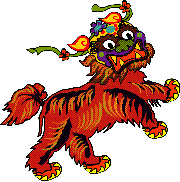
Taoist philosophy arose during one of the most confusing political eras in Chinese history, the "Warring States" period (475-221 B.C.).
For China it was a time of painful growth. Agriculture was intensified. New crops were introduced. Fertilizers were imported. Irrigation schemes became commonplace. Towns and cities sprang up, to serve both as fortresses and trade centres. Silk, lacquer, silver ornaments and other luxury goods changed hands as eagerly as wheat, rice and wool. The iron industry, based on locally invented blast furnaces, produced high quality tools and weapons. A more relaxed feudal system of government was replaced by centralized monarchies.
The new kings surrounded themselves with civil servants to tax the farmers. They raised professional armies to defend the land against enemies. For in this period of rapid change everyone was enemy of almost anyone else. Thirteen larger and smaller states were continuously in conflict with each other. The wars which thrived on the insatiable greed and ambition of kings, chancellors and generals, could never lead to lasting peace.
This was the chaos Chuang Tzu came to know so well as a minor official at Ch'i-Yuan in his home state of Meng. If we are to believe tradition, he left his post, withdrew to the countryside and turned philosopher, giving advice to whoever came to consult him.